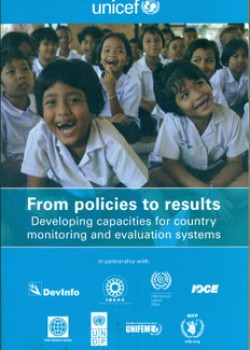
From Policies to Results
Developing Capacities for Country Monitoring and Evaluation Systems
Author : Anushyanthan, Vaidehi and Bamberger, Michael et al.
Editor: Segone, Marco.
Publisher: The United Nations Children,s Fund (UNICEF)
Place of Publish: USA, New York
Year: 2010
Page Numbers: 471
Acc. No: 3720
Class No: 374 FRO-ME
Category: Books & Reports
Subjects: Conflict
Type of Resource: Monograph
Languages: English
This is a UNICEF publication. Evaluation is getting increased attention and interest around the world. This is because it is believed to have the potential to provide sound answers to ‘enduring questions’ facing humanity such as, “how to make policies work better?”, “what interventions lead to success?” and “how can success be identified, sustained and replicated?” The intention of this issue, building on the previous series, is to explore further how monitoring and evaluation are expected to lead to results. “Results” implies improvements to the lives of people, as that is the ‘normal’ expected outcome of a public policy. A successful policy would be an ‘intelligent’ one in the sense that it is based on or influenced by ‘quality’ information, just as a tree is nurtured by ‘quality’ water and ingredients to provide healthy leaves and fruits. Policy design and evaluation processes are therefore intimately related, to enable the latter to feed back into the former.This publication aims to contribute to the international debate on moving from policies to results through country-led monitoring and evaluation systems, by providing new analysis on strengthening country monitoring and evaluation capacities. It does so by offering a number of strong contributions from senior officers in institutions dealing with national monitoring and evaluation capacity development.



